Technical Copywriter: Best Technical Writing Services
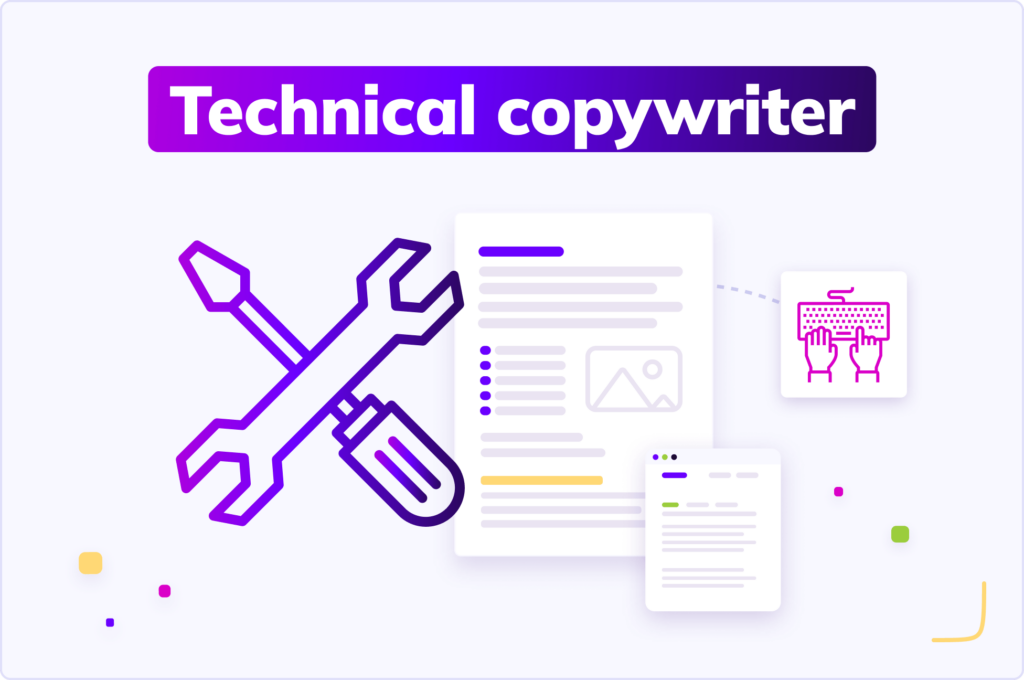
Imagine living in a world where expert technological solutions and innovations exist. Still, their benefits remain untapped simply because the average person cannot comprehend their underlying mechanisms or utilize them effectively. That’s where the role of a technical copywriter comes into play! They bridge the gap between tech experts and non-experts. In this comprehensive guide, we’ll dive into technical copywriting, ranging from its responsibilities to how AI can offer support in this domain.
What is technical copywriting?
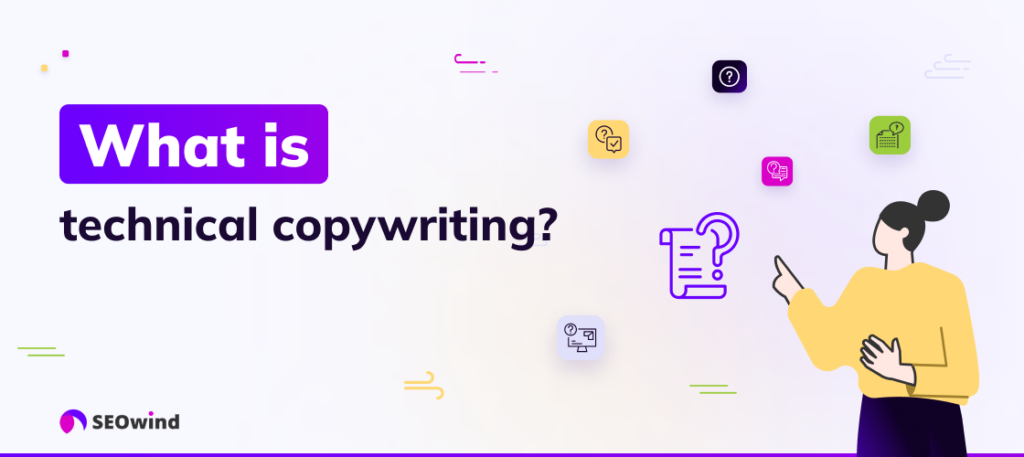
Technical copywriting transcends beyond your average content creation. It rests at the unique intersection of creativity and technology. While technology may seem dauntingly complex to some, that’s not quite how a seasoned technical copywriter sees it. To them, it is an intriguing language eagerly waiting to be translated into simpler terms for everyone else.
In essence, technical copywriting entails crafting engaging and clear content centered around scientific or technological concepts, which makes it easily understandable even to those outside the industry. The end goal? Amplifying product value by enlightening potential clients on why they need your tech solutions!
So next time you read an eloquently written piece explaining blockchain or data analytics with utmost simplicity – you have a professional technical copywriter to thank!
Note: Curious about what exactly such a fascinating role encompasses? Well then, let’s leap forward toward understanding the varied duties involved.
Understanding the role of a technical copywriter
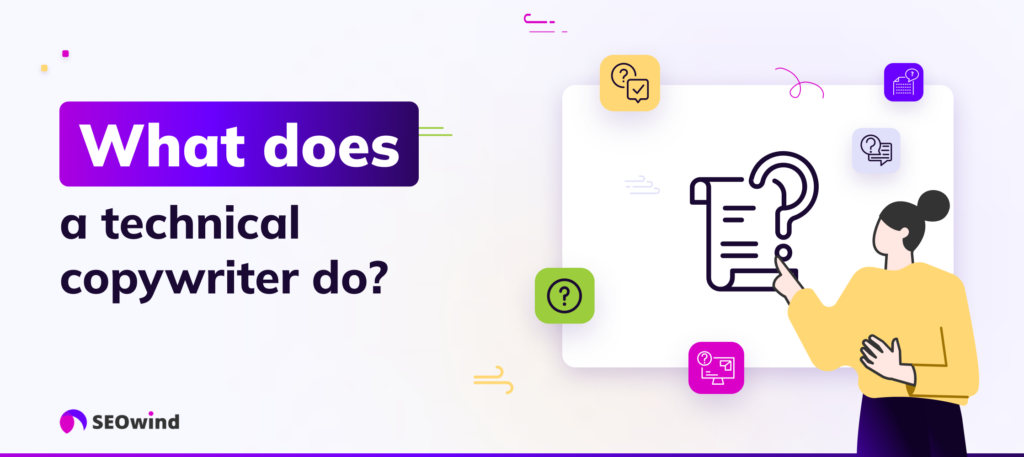
Before diving deeper, it’s crucial to understand what a technical copywriter does. A technical copywriter effectively communicates complex information in a manner that those unfamiliar with the subject matter can quickly grasp. Think of them as skilled translators whose work bridges the gap between tech teams and target audiences.
Responsibilities of a Technical Copywriter
Technical copywriters shoulder numerous responsibilities, from creating technical documents to crafting compelling sale copies. Here are some everyday tasks performed by expert tech copywriters:
- Creating User Manuals: These professionals excel at simplifying sophisticated ideas and documenting detailed instructions for products or services.
- Producing White Papers and Case Studies: They distill dense techno-jargon into engaging narratives without losing factual accuracy or diluting data points.
- Writing Product Descriptions: A quality tech copywriter leverages persuasive writing and technological know-how to appeal to consumers’ needs while demonstrating the product’s unique selling proposition (USP).
Skills Required to Excel as a Technical Copywriter
To thrive in this role, certain traits and skills come in handy:
- Proficiency in technology: Understanding intricate details about diverse technologies is necessary since explaining these concepts underpins their job.
- Superlative Writing Skills: Tech writers should be proficient technically and lyrically, ensuring comprehensive clarity while avoiding linguistic monotony.
- Research Prowess: They must masterfully dissect databases, market trends, scientific studies, and more, a skill that helps keep their content credible and compelling.
Furthermore, empathy, patience, teamwork spirit, and keen organizational capabilities are other notable attributes for shaping laypersons’ understanding.
What characteristics define a quality tech copywriter?
I believe an excellent tech copywriter creates compelling yet easy-to-understand content and shows great attention to detail. Here are some traits that define a proficient tech copywriter:
- Versatility Quality tech copywriters should be versatile enough to produce varying content types, such as blog posts, scripts, manuals, etc., depending on the project’s demand.
- Passion for Technology They should possess enthusiasm for all things tech; this passion will shine through in their writing.
- Detail-Oriented Approach With due care for minute specifics and even hidden nuances of a subject matter or product, they bring out its essence by penning engaging yet informative discourse.
In short, mastering technical jargon while possessing an engaging literary style is the mark of a fantastic tech copywriter. Having these varied skills helps them meet audience needs while delivering the necessary information seamlessly.
Who can benefit from technical copywriting?

There’s no denying that, at first glance, the term “technical copywriting” seems to be specific to tech businesses and software companies. However, reality paints a different picture altogether. In fact, I’d argue that almost any industry can reap the benefits of this unique form of content creation.
Let’s take a closer look at who stands to gain:
- Tech Start-ups and IT Companies: On an obvious note, technology-based firms and startups are key beneficiaries. They often require detailed explanations about their products or services in a language clear enough for people outside the tech space to comprehend.
- Educational Institutions: These days, universities and schools need curriculum developers adept at translating complex topics into easy-to-digest study materials, paving the way for better learning outcomes.
- Healthcare Organizations: Healthcare entities like pharmaceutical companies and hospitals can leverage technical copywriters’ abilities to explain complex medical terminologies and health guidelines to patients or the general public in simple terms.
- E-commerce Platforms: A vast category here is e-commerce platforms selling detailed products that could make miracles happen with precise product descriptions crafted by seasoned professionals in such tasks – you guessed it right, our dearest technical copywriters!
- Manufacturing Firms: Manufacturers of intricate equipment end up with user manuals that are confusing jumbles without an expert handcrafting them legibly.
What’s exciting is these examples are just a tiny fraction of industries potentially benefiting from technical copywriting skills! Any organization dealing with complicated concepts or technologies should consider allowing skilled copywriters the reins on their communications letter front. This will result in significantly elevated comprehension levels among their target audience members.
Now, you might wonder how it all fits together. Well, it works out pretty seamlessly for one prime reason: simplifying complexity is the heart and soul of what effective technical copywriters do best!
When should companies consider hiring a technical copywriter?
The prospect of hiring a technical copywriter often raises certain questions for businesses, especially regarding the right timing. So, when exactly should companies contemplate this essential step?
Present the product or service
One definitive indicator is when a company’s product or service has technical specifics that require a clear and appealing presentation to prospective customers or users. At times, internal teams may struggle to articulate these dynamic aspects clearly due to their inherent complexity.
Let’s consider a tech firm releasing an innovative software solution. The development team understands the product inside out yet might flounder, translating its jargon-loaded intricacies into engaging, easily digestible content. Here, a seasoned technical copywriter transforms dense information into compelling copy without diluting anything important.
Company growth
Another equally valid reason relates directly to company growth. When businesses expand rapidly and diversify their services or products across different areas — but time-strapped teams can’t keep up with developing quality communications materials — it’s practical and even vital to bring a professional writer well-versed in tackling such complexities on board.
Additionally, companies entering global markets requiring localized content could benefit from employing specialized writers experienced in adaption while preserving the core message. With linguistic nuance and cultural sensitivity among key considerations, think beyond simple translation; shaping your copy professionally becomes paramount.
SEO performance
Last but not least, SEO performance drop-offs call for immediate attention, too! Suppose analytics shows that keyword rankings are declining over time on your blog posts or landing pages containing heavy technical details. In that case, you need to ask an SEO-savvy technical copywriter to refine the style towards more web-friendly approaches.
How can AI support technical copywriters?

Artificial Intelligence (AI) emerges as a game-changing tool capable of assisting technical copywriters, simplifying tasks, and increasing productivity. Let’s delve into some ways AI can support the world of copywriting technology.
Tools for Improved Efficiency
Thanks to AI, several automated tools have come up that aid in accomplishing routine tasks—ranging from factual research to proofreading—much faster than manual processes. It saves time and ensures accuracy, allowing the writer to focus more on creative aspects.
Aid in SEO Optimization
In contemporary digital practices, search engine optimization (SEO) is integral. Certain AI tools assist copywriters in creating SEO-friendly content by suggesting high-ranking keywords and demonstrating how they can be deftly inserted within the text without disrupting the natural flow.
Enhanced Content Personalization
AI brings analytics to the table that allows a better understanding of user behavior, enabling personalized content development. This kind of targeted approach significantly boosts engagement rates.
Simplified Multilingual Writing
Language is no longer a barrier, with AI-driven translation services offering accurate translations for multilingual audiences. Such real-time translations add value to the international visibility of a brand or service.
Moreover, products like SEOwind play a pivotal role here. By incorporating Artificial Intelligence into each process step – from comprehensive keyword research to consistent tone maintenance – SEOwind makes it possible for companies to scale up their content creation process while guaranteeing quality akin to human writing.
Indeed, AI has emerged as an ally rather than a competition for technical copywriters – reinforcing their capabilities while freeing them from mundane tasks. Embracing AI holds enormous potential for future-driven copywriting technology services.
How SEOwind helps with technical copywriting
Through my writing journey, I’ve come across numerous tools meant to simplify the content creation process. Among them stands SEOwind with its unique tech copywriting assistance. To say it’s remarkable would be an understatement. but let me break it down for you.
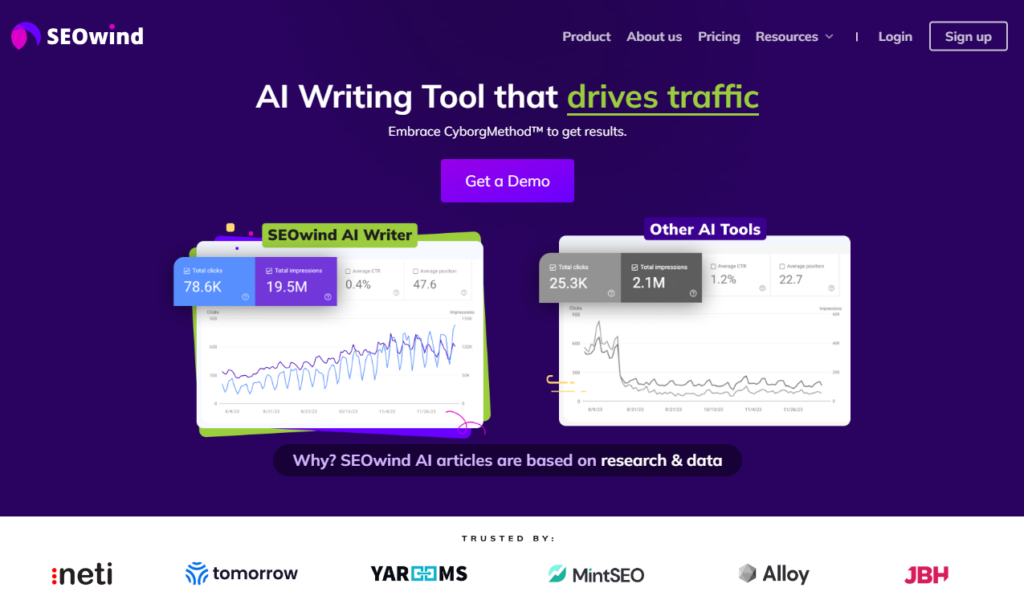
Drive organic traffic with high-quality AI content
A primary challenge in tech copywriting is producing quality content that enlightens readers and magnetizes search engine attention. Thankfully, SEOwind has this covered. It leverages Artificial Intelligence (AI) algorithms to write high-quality technical content that drives organic traffic.
The secret here isn’t just in incorporating keywords, but creating comprehensive pieces that answer user queries accurately and extensively. The balance of depth and relevance achieved by SEOwind goes unmatched compared to other AI writing tools.
Conduct in-depth content research
Before initiating the writing process, I believe deep diving into pertinent research is critical. SEOwind conducts thorough keyword and topic analysis. This extensive research makes the tool adept at understanding which topics are trending within your industry or of interest among your target audience, thereby adding more value to your tech copywriting mission.
Understand search intent inside out
Rather than seeing users’ online searches simply as strings of words, SEOwind peels back another layer to understand what those users truly want – their search intent! By determining whether they intend to learn, buy, or navigate somewhere specific, the tool can curate tailor-made copies fulfilling that exact search purpose, a significant game-changer!
Unique articles aligned with brand voice
There is a lot of generic robotic-sounding content stirred up by many AI writers today. That’s why it’s essential your brand output remains authentic while your human-esque tone is intact! Luckily for us, SEOwind rounds up AI-powered writing abilities with personalization features to ensure every article aligns seamlessly with your defined brand voice.
AI content enriched with stats and quotes
The true potency of tech copywriting lies in credibility. SEOwind understands this all too well by enriching AI-generated content with valid statistics and noteworthy quotes from reliable sources. These additions lend the necessary authoritative tone that legal, medical, or technical fields would respect.
AI articles with internal links
SEO optimization is more than just fitting a set of keywords into your content. It involves strategic incorporation of hyperlinks guiding readers to other relevant sections within your site, a nuanced aspect SEOwind has skillfully mastered across all its AI articles.
Ultimately, as someone who profoundly enjoys crafting words, I find that SEOwind’s inclusive approach towards understanding and implementing practical aspects of tech copywriting reliably furthers my craft while keeping pace with modern times. Whether you’re struggling to fathom technical jargon or aiming to sail smoothly on the SEO grind, the platform has covered every step!
Types of Technical Copywriting
When providing high-quality technical writing services, it’s crucial to understand various forms of technical copywriting. Each type has its own specific requirements and targets a different audience. Let’s delve into some of the prominent types in this domain.
- Software Documentation: This copywriting style involves producing user guides, manuals, FAQs, help files, etc., specifically for software applications. The primary objective is to simplify complex processes for end-users or consumers. A well-crafted software documentation can significantly enhance user experience by streamlining intricate technological jargon associated with product usage.
- Technical Content Blogs: Technical blogs should not be overlooked as they are integral in promoting products or services offered by tech-based companies. These blogs dive deep into the features and benefits of a particular technology or solution while keeping the language simple enough for non-experts to comprehend.
- Product Descriptions: Crafting compelling yet informative descriptions about technology-driven products requires an adept hand at technical copywriting. Those descriptions must highlight specifications without losing sight of how those features benefit the consumer.
- Installation Guides/Manuals: Highly detailed instructions on setting up hardware or software installations also fall under this category. Clear step-by-step guides that enable users to complete set-up processes quickly exemplify excellent technical copywriting skills.
- White Papers: White papers aim to persuade businesses or individuals about the usefulness and superiority of a particular technology or methodology over others on the market – a challenging job requiring a unique blend of persuasive and technical writing abilities.
These areas demonstrate that while each form has its own specifics and complexity level, all strands share the same aim. Their goal is to translate complex information into understandable content without diminishing its value or meaning, making them distinct features within the wider realm called ‘technical copywriting.’
Difference Between Technical Copywriting, Technical Writing, and Technical Content Writing
To clarify the distinctions between these three disciplines – technical copywriting, technical writing, and technical content writing – we must first define them.
Technical copywriting involves creating engaging promotional content related to advanced subjects or technologies. A proficient technical copywriter creates easy-to-understand materials about complex products or services, ensuring they are alluring enough to prompt the desired consumer action.
On the other hand, technical writing tends to be more instructional and factual in nature. It may involve user manuals, reports, and white papers, among others, aimed at providing clear decision-making information rather than directly promoting a product or service.
Lastly, technical content writing sits comfortably between these two fields: informative (like technical writing) yet creative and audience-centered (like copywriting). It includes blog posts or articles that educate readers on specific topics without only focusing on selling.
Is there any overlap in copywriting and technical writing?
Funnily enough, while these trio are distinctly different categories with unique specializations, fascinating overlaps exist. For one instance, technical and copywriters need a deep understanding of their subject matter, engineering principles, or cutting-edge software capabilities. Likewise, they share the ultimate goal of effectively conveying that information to a particular audience – albeit in different tones and purposes.
Additionally, whether you’re composing compelling sales-driven material as a technical copywriter or offering precise step-by-step instruction as a technical writer, attention to detail is paramount. Furthermore, brevity is valued across these domains. Being able to communicate intricate concepts can truly set apart a proficient writer in either field.
Exploring the variances in skill set and purpose
Despite their overarching similarities, such as needing high-quality research skills & an aptitude for structured communication, several key differences distinguishing technical copywriters, copyrighters, and technical content writers are worth diving into.
Primarily, the purpose of the text stands out as a significant differentiator: while technical copywriting attempts to engage and persuade potential customers, technical writing seeks to educate and instruct the user. This invariably affects each discipline’s approach – one leans on persuasion writing. At the same time, the other prioritizes clarity & instructional structuring.
Assertively, variation in the essential skill sets required for each job role also exists. For instance, creative skills may be more integral for a copywriter who adopts ingenious ways to promote a product. Meanwhile, a technical writer will hone their ability to communicate complex procedures in an orderly & understandable fashion.
Exploring these nuances aids companies & individual writers alike in understanding which service would best address their needs or where they’d excel professionally. Understanding these differences is not just about semantics but carving well-defined, trustworthy paths toward achieving specific communications goals.
Frequently Asked Questions about Technical Copywriting
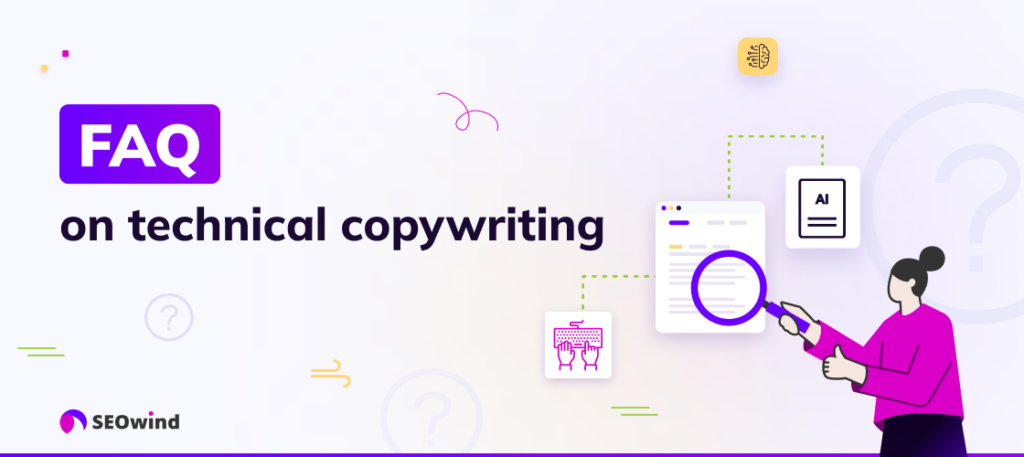
It’s pretty common to come across a few curiosities in technical copywriting. Everything boils down to, as you’d expect: “How do I break into this industry?” and “What tools will I need to be successful?”. Let’s delve into these questions one by one.
How does one transition into a career in technical copywriting?
Technical copywriting isn’t really about writing for experts. It’s about simplifying technical topics so a non-specialized audience can understand them. Breaking into the role of a technical copywriter boils down to acquiring three main things:
- Knowledge – Get prepared for this novel journey by learning more about your niche in the tech industry. This might mean going back to school or enrolling online for courses related to computer science, coding languages, software development, or data science.
- Skills – Start developing your flair for writing clear, concise, and easy-to-understand content – all essential ingredients of great copywriting.
- Experience – Finally, get some practical experience under your belt! You could start by offering your services on freelance platforms, contributing articles on tech subjects to blogs or websites pro bono, or landing an entry-level job as part of an IT firm’s marketing team.
Remember, patience is key! Take small steps towards your goal every day.
What software tools are essential for a technical copywriter?
As we’re inclined toward using AI solutions nowadays in most industries (even in creative fields), there have been incredible advancements in applications designed specifically to promote efficiency in writing and editing processes.
A good word processor tops the chart; something like Google Docs works perfectly fine. Grammarly comes next – it polishes your text by providing real-time feedback on grammar, readability, conciseness, and clarity.
At the same time, keyword research tools like Semrush, SEOwind, or Moz are instrumental in fine-tuning your SEO strategies. Finally, a tool like Hemingway Editor can particularly help keep your sentences easy to read.
Moreover, to manage multiple projects and deadlines, writers often rely on Project Management tools such as Trello, Asana, or Jira – these provide a high-level organization that makes the work process seamless and effective.
As a technical copywriter, it’s essential to be adaptable enough to leverage new tools as they evolve, technology will continue to transform our ways of working in more profound fashions with time!